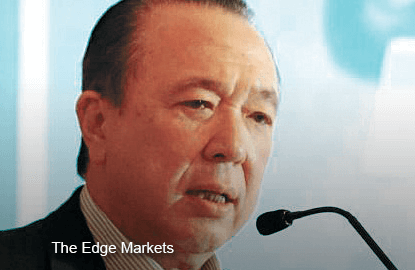
 FELDA GLOBAL VENTURES HOLDINGS BHD’S biggest acquisition to date — a 37% stake in PT Eagle High Plantations Tbk for over RM2.4 billion cash plus shares — seems fairly priced, given the assets in the Indonesian company. Still, there is a big question mark hanging over Eagle High’s leverage.
FELDA GLOBAL VENTURES HOLDINGS BHD’S biggest acquisition to date — a 37% stake in PT Eagle High Plantations Tbk for over RM2.4 billion cash plus shares — seems fairly priced, given the assets in the Indonesian company. Still, there is a big question mark hanging over Eagle High’s leverage.
In a filing with Bursa Malaysia last Friday, FGV announced that it had entered into a heads of agreement with Rajawali Group to acquire the equity interest in Eagle High. The plantation giant will pay RM2.37 billion in cash and issue 95 million new shares to fund the deal.
Eagle High has more than 400,000ha of planted and unplanted land in Kalimantan, Sumatra, and in the Papua province in Indonesia.
Additionally, FGV will acquire 95% equity interest in Rajawali’s sugar project for RM249 million.
The heads of agreement makes FGV the largest individual shareholder in Eagle High, albeit without a controlling stake. Rajawali Corp will remain one of the major shareholders with its stake reduced to just under 30%.
The agreement may come under heavy fire because the consideration of IDR800 per Eagle High share is at a steep premium to the prevailing market price of IDR450. But some may point out FGV’s willingness to pay top dollar for previous acquisitions, for example the RM1.2 billion takeover of Pontian United Plantations Bhd or the RM628 million purchase of Asian Plantations Ltd.
FGV’s stakeholders may also voice their concerns about how its earnings and share price have been on a long-term decline since its June 2012 listing. Including the recently announced deal, FGV would have spent more than RM5 billion on acquisitions in just three years while revenue and net income have lagged behind.
Recent fluctuations in Eagle High’s shares also do not put the offer price in a good light. The stock plummeted to IDR245 as recently as May 4 but has gained as much as 80% since. Even at its closing price of IDR450 last Friday, FGV’s offer price of IDR800 represents a 78% premium to the open market price.
Based on the age profile of Eagle High’s trees, its planted land of 151,357ha holds a lot of promise. Some 76,000ha are young trees between the ages of four and eight and will reach prime stage within five years.
Combined with FGV’s own 74,000ha of young trees, the output and yield potential in the next few years could prove to be a staggering revenue contributor to the group.
Additionally, land valuation assumptions indicate that FGV is not paying an exorbitant price for Eagle High’s assets. According to InsiderAsia Research calculations, based on FGV’s acquisition cost, Eagle High’s total planted land carries a fair value of RM8.33 billion, which translates into about RM55,000 per hectare.
This figure is comparable to that of other plantation players that own land with similarly young tree profiles. Among the eight companies analysed, the enterprise value per planted hectare worked out to a mean of about RM64,000. For a shareholder with a long-term perspective, the value per planted hectare does not seem unreasonable, given the long-term growth expectations of the land.
The quality of the plantation assets aside, a caveat on the deal is Eagle High’s indebtedness, which could prove to be a headache for FGV. Eagle High’s gearing ratio is at an astounding 107 times and the company continues to be encumbered by massive interest expenses — IDR111 billion as at its financial quarter ended March 31 (1QFY2015) — while its total net debt exposure was IDR7.24 trillion.
Net profit in 1QFY2015 was just IDR7.1 billion, which is an ominous sign because it was IDR189.5 billion for the full FY2014.
With current low yields and crude palm oil prices, a turnaround in Eagle High’s earnings in the short term is highly unlikely. Any income generated from operations will be diverted to servicing debt, which means FGV will see neither earnings nor cash flow from this investment in the foreseeable future.
Another issue is that the deal does not give FGV a controlling stake in Eagle High, which will prevent it from undertaking a restructuring of the latter’s debt. There is also no other controlling shareholder that can inject fresh capital into Eagle High to turn its business around.
Rajawali seems to be in a weak financial position as it is also seeking to cash out of its gold mining subsidiary PT Archi Indonesia, which it plans to list next year. An attempt at a US$374 million initial public offering was shelved last year due to weak investor interest.
In fact, it is clear that Rajawali will emerge the biggest winner from the Eagle High deal with FGV — it is a golden opportunity to secure billions of ringgit in cash and dispose of a highly leveraged asset.
Eagle High was formerly known as PT BW Plantations Tbk before the latter’s assets were consolidated into Rajawali’s plantation holdings, turning the enlarged entity into Indonesia’s third biggest oil palm company by planted acreage.
The Rajawali conglomerate, which has interests in commodities, telecommunications, hospitality and retail, among others, is helmed by Tan Sri Peter Sondakh, who, according to Forbes, is Indonesia’s sixth richest man with a net worth of US$2.3 billion. He is also said to be closely linked to Malaysia’s political elite.

This article first appeared in The Edge Malaysia Weekly, on June 15 - 21, 2015.
Save by subscribing to us for your print and/or digital copy.
P/S: The Edge is also available on Apple's AppStore and Androids' Google Play.